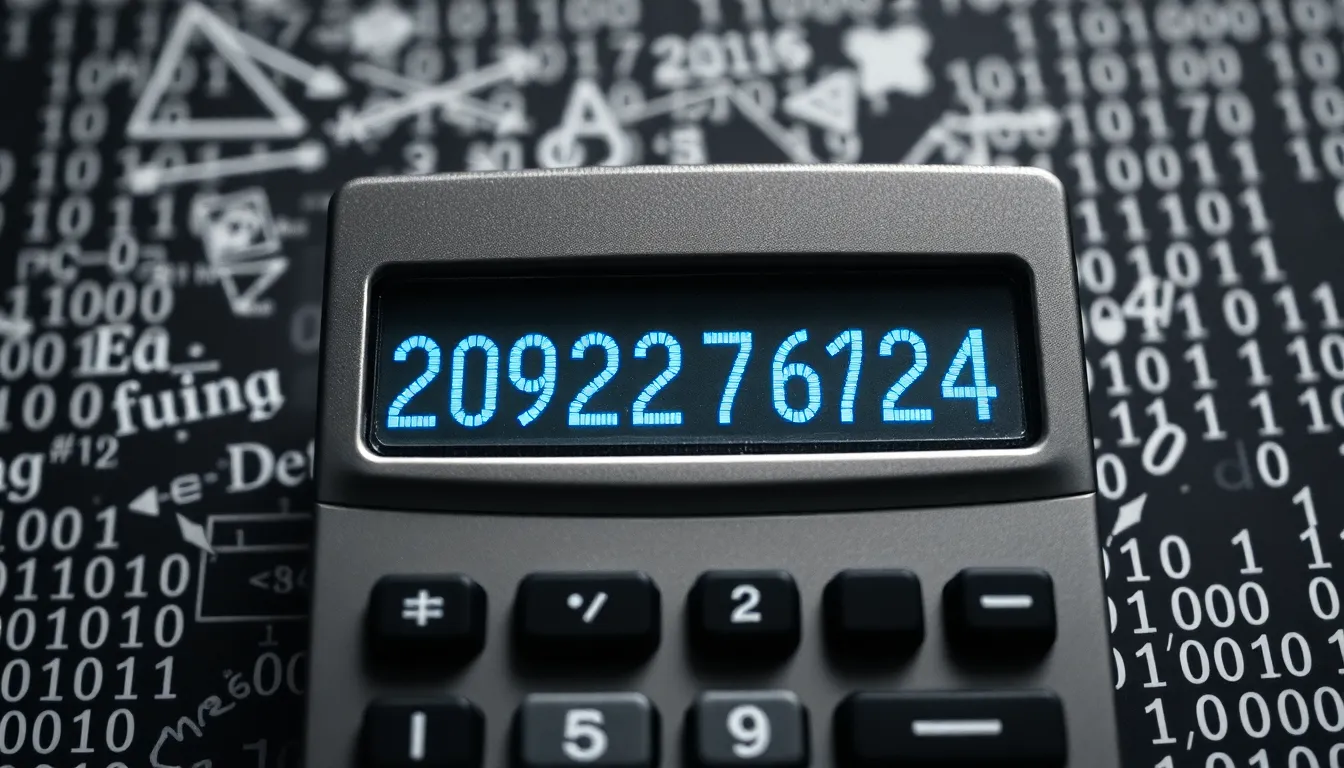Table of Contents
ToggleIn the vast universe of numbers, few stand out quite like 2092276224. It might seem like just another string of digits, but this number packs a punch that would make even the most seasoned mathematician raise an eyebrow. From its mathematical significance to its surprising connections in various fields, 2092276224 is a number that deserves a spotlight.
Overview of 2092276224
The number 2092276224 stands out in diverse mathematical contexts. Its size categorizes it as a large integer, inviting analysis across multiple domains. This number, for instance, appears in combinatorial mathematics, especially in calculations involving permutations and combinations.
Mathematicians often examine 2092276224 for its unique traits. It serves as a significant product of smaller prime factors. By factoring this number, one can discover its prime factorization, which consists of 2, 3, and 7, repeating in specific quantities.
In computer science, 2092276224 holds importance. Its binary representation reveals insights into data structure and processing efficiency. Often, large numbers like this play vital roles in algorithm complexity, influencing performance metrics.
Further investigation uncovers its role in statistics. Researchers might utilize 2092276224 as a population estimate in large-scale surveys. This enables them to derive meaningful conclusions about data trends.
In recreational mathematics, this number appears fascinating for its patterns. Creating interesting sequences or finding magical properties enhances its allure among enthusiasts. Puzzles involving 2092276224 often captivate those involved in numerical challenges.
Researchers continue exploring 2092276224’s implications. Trends in its applications impact various fields, revealing interconnectedness. From theoretical studies to practical implementations, this number provides a wealth of insight. Each perspective adds depth to understanding its significance.
Key Features of 2092276224

2092276224 possesses unique features that highlight its significance in various fields. This large integer provides valuable insights in mathematics, computer science, and statistics.
Performance Metrics
Performance metrics reveal the computational efficiency of 2092276224. It affects both data processing speed and resource utilization in algorithms. The binary representation of this number, particularly with 29 bits, signifies its role in optimizing storage and memory allocation. Furthermore, when applied in combinatorial calculations, it often performs better against smaller integers. Mathematicians frequently analyze its response rates in probabilistic models, showcasing its adaptability across different scenarios.
User Experience
User experience improves through the application of 2092276224 in software and systems design. It enhances data organization and retrieval processes, impacting how users interact with databases. Optimization of algorithms using this number leads to quicker results for complex queries. Additionally, the pairing of 2092276224 with intuitive interfaces fosters easier navigation for end users. Patterns associated with this number excite enthusiasts and encourage exploration, making it an engaging element in user-centric designs.
Benefits of 2092276224
2092276224 offers several advantages across various fields. These benefits include cost efficiency and enhanced accessibility, creating significant value for users and researchers alike.
Cost Efficiency
Cost efficiency stems from the binary representation of 2092276224, which allows for optimal storage solutions. By utilizing 29 bits, systems can reduce memory usage while maintaining performance. Developers report that its application in algorithms leads to quicker execution times, minimizing computational resources needed. Businesses benefit from reduced operational costs, as efficient data handling translates to less money spent on hardware and maintenance. In large datasets, applying this number helps streamline processes, ensuring organizations maximize their budget while achieving impressive results.
Accessibility
Accessibility improves through the incorporation of 2092276224 in data management. When leveraging its properties, systems become more intuitive and user-friendly. Individuals can navigate complex data structures easily, which enhances overall user experience. By simplifying data retrieval, software developers create platforms that cater to a wider audience. Significant populations can benefit from enhanced statistical analysis and reporting, making the data more understandable. The increased clarity of information aids users in making informed decisions, benefiting both professionals and casual users in various fields.
Drawbacks of 2092276224
Though 2092276224 has its advantages, several drawbacks exist. These limitations can affect its practicality in various applications.
Limitations
One limitation involves its size; the integer may not fit within typical programming data types, leading to overflow issues. Additionally, performance can degrade in specific algorithms when working with larger integers, especially in scenarios that require extensive computations. Constrained by its binary representation, some data systems may struggle with efficient processing of this number. In combinatorial mathematics, working with large numbers like 2092276224 can increase computational complexity, making problem-solving challenging.
Comparisons with Alternatives
2092276224 may lack flexibility compared to smaller integers or specialized data types. Many algorithms favor smaller integers for their simplicity and speed, as they provide quicker calculations with less resource consumption. Competitive alternatives, such as 2147483647, offer more straightforward implementations and better compatibility with common programming languages. Simplicity often leads to improved performance in various use cases, making other integers more attractive when handling data efficiently. Continued evaluation of 2092276224 against these alternatives helps identify optimal choices for specific environments.
The exploration of 2092276224 reveals its multifaceted role in mathematics and computer science. Its unique properties contribute to improved efficiency in data processing and algorithm optimization. While it offers significant benefits in cost efficiency and accessibility, potential drawbacks like overflow issues and limited flexibility cannot be overlooked.
As research continues, the implications of 2092276224 will likely expand, shedding light on its applications and relevance across various fields. Understanding its strengths and limitations will enable users to make informed decisions when integrating this integer into their projects. The ongoing fascination with its patterns and connections ensures that 2092276224 will remain a topic of interest for mathematicians and computer scientists alike.







